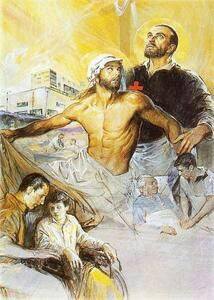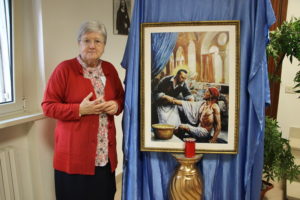The very title of the paper that was entrusted to me offers some indications as to how to explore the meaning of the vocation of the lay faithful, and more specifically of those lay people who live following the specific charism and the spirituality of St. Camillus.
We speak about ‘vocation’ in order to emphasise that our lives are not a chance wandering. They have a direction, an indication of the pathway to follow in order to live our lives with our gaze directed towards good, witnesses to the merciful love of the Lord, in order to carry out, during our lives, the life project that God conceived for us in the world in order to reach that destination towards which we are journeying.
We know, even if at times it is hard for us to recognise them and live them, that we have received from God many gifts: life, faith, an encounter with the Lord Jesus who points out to us the way to live in fullness, to live with the ‘joy of the Gospel’ in our hearts. For this reason, we should always be grateful for the profound joy that dwells within us, as the exhortation Evangelii Gaudium, which begins in the following way, says: ‘The joy of the gospel fills the hearts and lives of all who encounter Jesus. Those who accept his offer of salvation are set free from sin, sorrow, inner emptiness and loneliness. With Christ joy is constantly born anew’.
If Christ is at the centre of my life, this deep joy will dwell in me, a joy that nobody can take away from me, even at the most difficult and tiring moments of my life, even when suffering is present. I will have peace inside me if I know how to entrust myself to the Lord, who is the Father…this is not an easy journey, it is not even automatic, but it is possible to live the Christian life in this way, in faith, with the strength of prayer and the Word of God, with the help of the brothers and sisters who are at our side and of the Christian community.
Faith gives sense to life, it fills it with meaning; we are ‘called’ to do good and to demonstrate love and fraternity in our daily lives. This is a vocation that welcomes, deepens and develops the gift of baptismal consecration, the gift of being the children of God, the gift of the Holy Spirit that confirms and strengthens us in our faith and hope, the gift of the sacrament and in particular of the Eucharist.
At n. 15 of the apostolic exhortation Gaudete et exsultate of Pope Francis we read the following words: ‘Let the grace of your baptism bear fruit in a path of holiness. Let everything be open to God; turn to him in every situation. Do not be dismayed, for the power of the Holy Spirit enables you to do this, and holiness, in the end, is the fruit of the Holy Spirit in your life (cf. Gal 5:22-23). When you feel the temptation to dwell on your own weakness, raise your eyes to Christ crucified and say: “Lord, I am a poor sinner, but you can work the miracle of making me a little bit better”. In the Church, holy yet made up of sinners, you will find everything you need to grow towards holiness. The Lord has bestowed on the Church the gifts of scripture, the sacraments, holy places, living communities, the witness of the saints and a multifaceted beauty that proceeds from God’s love, “like a bride bedecked with
And at n. 11 of the same apostolic exhortation we read: ‘The important thing is that each believer discern his or her own path, that they bring out the very best of themselves, the most personal gifts that God has placed in their hearts (cf. 1 Cor 12:7), rather than hopelessly trying to imitate something not meant for them. We are all called to be witnesses, but there are many actual ways of bearing witness’.
The lay vocation: called to live one’s faith and one’s baptismal consecration in the context of one’s own daily life, in one’s profession, one’s family, in social and political engagement, in voluntary work and in caring for the sick.
The Second Vatican Council, the documents of that Council, the Magisterium of the Church, and the biblical and theological studies of recent years have all sought to highlight, explore and develop the meaning and the value of the vocation of the laity, recognising that each vocation has equal dignity and valuing the presence of women in the Church. This is a pathway on an upward gradient that advances by small steps, steps that are at time arduous in the real life of the ecclesial community, with different durations and forms in different cultures, individual Christian communities and local Churches.
In my experience it is also a communal journey of thought, of listening to each other, of looking ahead as a community, of learning to see and read the needs of individuals and communities, in joint responsibility, as regards decision-making as well, for the good of the community. I am thinking specifically of local communities, parishes and groups that, for example, take responsibility for the sick of the community, or of a hospital, visiting them, providing them with care…Each lay person in the community to which they belong has their own place, according to the vocation that they have received, but we should remember that the first mandate of a Christian is to proclaim; it is evangelisation (Lk 9:1-6).
















Camillians on Facebook
Camillians on Twitter
Camillians on Instagram